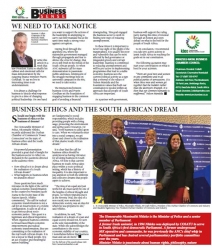Business Ethics and the South African Dream2017-04-12 Should one begin with the business of ethics or the business of dreams?
The Honourable Minister of Police, Nkosinathi Nhleko, recently addressed the Durban Chamber of Commerce's 'Power Connection' on the topic of business ethics and the South African dream. His powerful presentation provided a great deal of insight for the business sector to reflect on. Included in the questions directed at the audience were:
When organised business commits to broad-based black economic empowerment and radical economic transformation, they are committing to the realisation of the real South African dream. It is not a favour to black people. It is an act of justice and meaningful nation-building." Nhleko says that sound ethics are fundamental to social responsibility, which includes providing people with a living wage, protecting the environment and saving scarce resources. He said, "Even business is called upon to care. When we voluntarily enter into a social compact, we get closer and closer to the realisation of that elusive South African dream." It is clear that the call for business ethics should be understood as having relevance for all doing business in South Africa. Of note is that current business in South Africa takes place within a socio-political setting, which has a history of inequality. It is also important to pay attention to both the different and collective dreams that people aspire to achieve. "The idea of an equal and just world for all, must surely be one of the heights of ethical thought and praxis. As Nelson Mandela put it at the Rivonia Trial, the idea of a non-racial, non-sexist and democratic society, was an idea for which he was prepared to die," said Nhleko. In addition, he said, "The realisation of a dream of a just and equal society should not, be seen as the sole responsibility of the state. While one acknowledges the contribution to the socio-economic stability of our country, I nonetheless believe that business must and can do more." For the full text of his speech please visit http://www.kznchamber.co.za/ |
Business Ethics and the South African Dream
Copyright © 2024 KwaZulu-Natal Top Business
